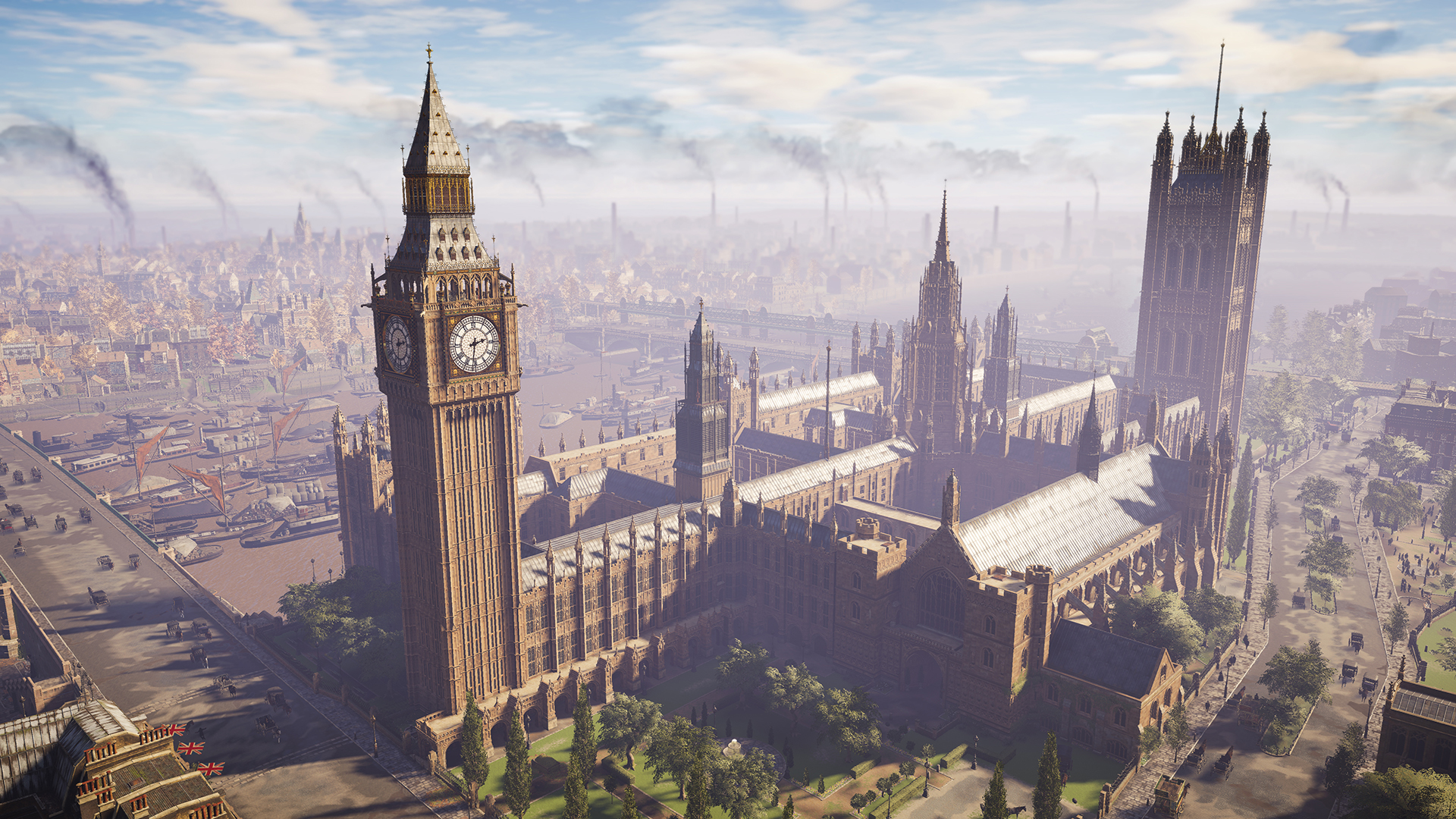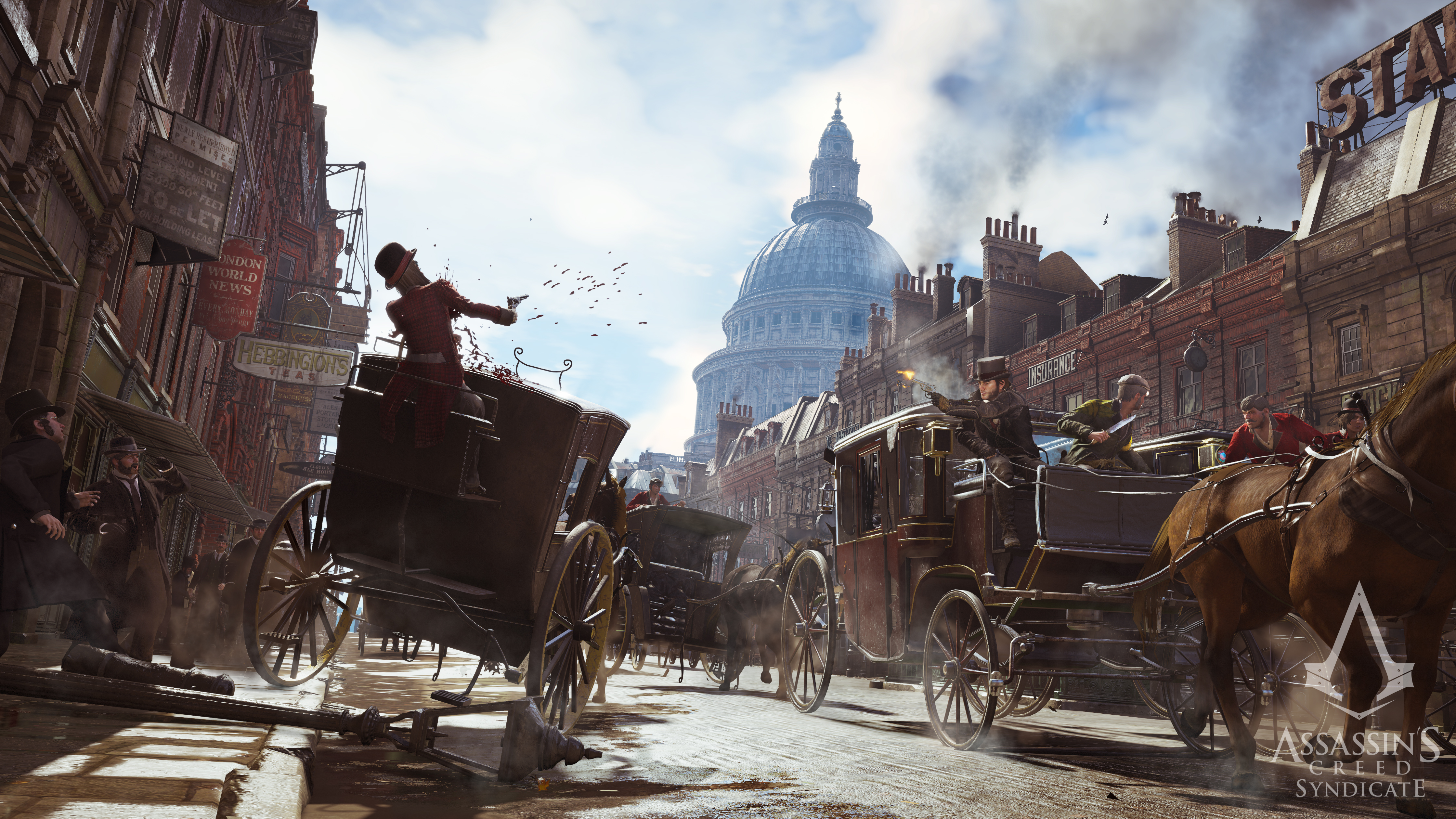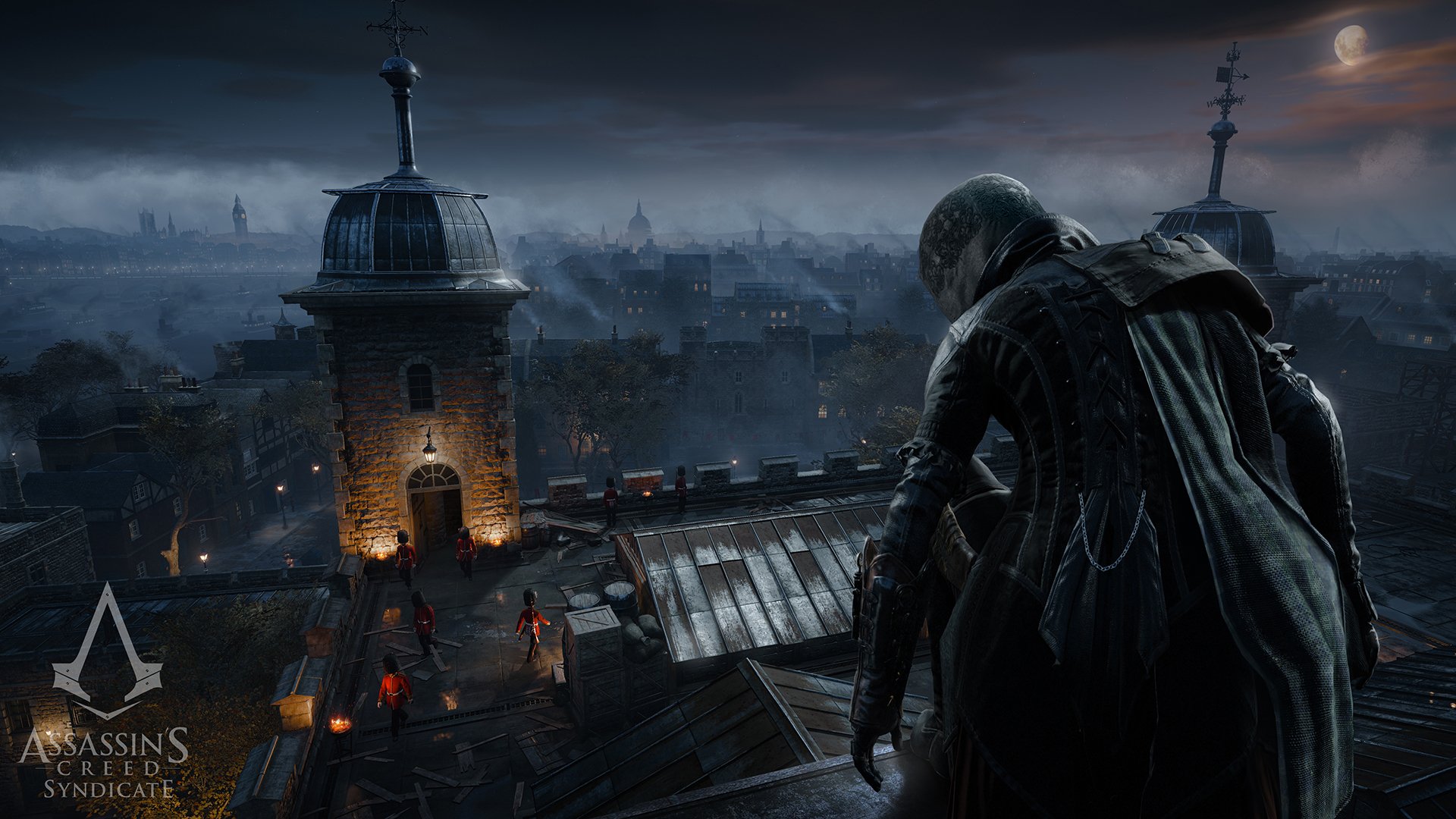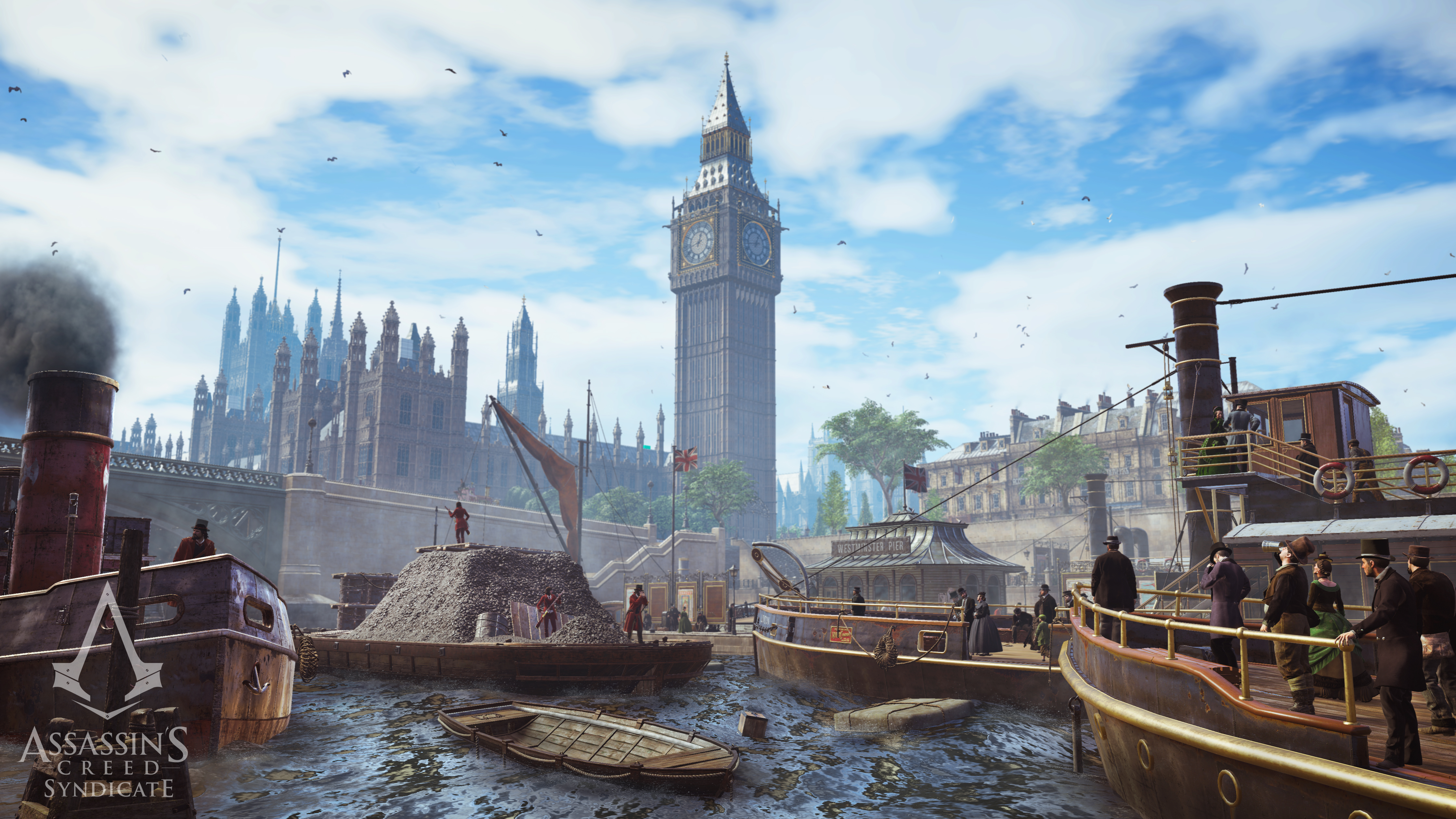A tourist in your own town - visiting Assassins Creed Syndicates London
Did you know that the huge, famous clock that juts priapically out of London’s Palace of Westminster is called “Elizabeth Tower”? Before 2012 - when all of Britain celebrated the longevity of its (alleged) Reptilian Überqueen by naming bits of masonry after her - it was just called “Clock Tower” (which has always struck me as drably sad, like when rich people without proper feelings just name their dog, “Dog”). Of course, no one other than bored historians and quiz enthusiasts actually call it either of these things. Get into one of London’s renowned Hackney cabs and ask for Elizabeth Tower and you’re more likely to be taken to a block of flats in Penge.
Big Ben is a parasitic nickname, one that’s assumed control of its host, like how Michael Aday is now just Meat Loaf, or latent antimatter is Cheez Whiz. It denotes a thing we understand, but only because we’ve all accepted that it does so. If I wanted to go full Wachowski on your ass, I’d say that Big Ben, in the way we refer to it, does not exist. Which brings me to the new Assassin’s Creed game.

I’m not from Florence, or Paris, or The Sea, so I’ve never had intimate knowledge of the places Assassin’s Creed has been recreating for the last near-decade. With Syndicate’s shift to Victorian London, however, I’m suddenly playing a very different kind of game. The act of having your city turned into a video game space makes you both an insider and outsider - it’s bewildering, and brilliant, like being let in on an in-joke that you don’t quite get, but sounds funny.
Not only do I know this place myself, but the combination of the fact that this is by far the most recent setting for the series, and that London has stubbornly kept its madman’s town planning for nigh-on a thousand years, means that not only do I get the ambience, but I start to legitimately recognise places I’ve been, and become baffled when I suddenly don’t know where I am anymore.

I start my demo in Whitechapel - an area I lived in for a year - and I’m immediately jolted from my mission to start a street-level guerrilla resistance into a game of alternate-reality Google Street Viewing. I walk away from Henry Green (the British-Indian Assassin/tutorial signpost included to signal London’s impending multiculturalism) and try to find Commercial Road (where, not too long after the game’s 1868 setting, London’s first mosque will be built, signalling much the same thing). I peer at street layouts and wonder, if I waited long enough, whether Euro Miss, the weird clothes shop I used to pass that never seems to open, would appear.
I also get lost very quickly. I could tell you an exact route from Whitechapel Station to the Thames, but setting myself the challenge of taking it in Syndicate has me spinning. The Aldgate area appears to have disappeared almost entirely, meaning I skip over Whitechapel’s tenement roofs and find myself right in amongst the industrial wharves of Wapping being used for their original purpose, before they were retooled into airy housing for all my friends who got proper jobs and can afford things like a local butcher’s prices, or more than one pair of shoes. I can know exactly where I am one second, and be totally out of place the next, London stretched and chopped and reintegrated as I go. I can navigate a faked-up 1100s Jerusalem better than a representation of the city I’ve lived in. That’s odd.

Clock Tower - you know, ‘Big Ben’ - is visible from almost everywhere. The director tells me that it’s probably among the tallest buildings ever included in an Assassin’s Creed game - climbing it without the game’s new Rope Launcher item takes full minutes of ape-scrambling and impossible leaps. Once you reach the Synchronise point (I’m sad to see that it’s circled by a now horribly displaced eagle, and not one of Trafalgar Square’s ragged, bully-boy pigeons) you get a full view. It looks strange, places I know nestling far too close to the Thames’ bulging route through the city. Like Big Ben, we’re just calling this London because we’re told that’s what it is.
Weekly digests, tales from the communities you love, and more
Of course, neither of these things are a problem. We call Syndicate’s setting London because it fits the fantasy. We call it Big Ben because it’s nice to make a building sound like it might have a job on the side as a wrestler. That the majority of you reading will have had no idea what or where I’ve been talking about for much of the article is sort of the point. For everyone else, this could well be the London they get to know best in their lives. In a few months, you might get lost yourself trying to follow routes you took chasing down quasi-religious schemers, finding yourself in a Tooting Bec alleyway; terrified, and alone, and in Tooting Bec.

Everyone’s a tourist in Syndicate’s London - shown best by a very brief moment before I even start the game:
Before we were allowed to play, a man from Ubisoft Quebec started a short presentation, to “prepare us” for the demo by showing off some of the game’s early scenes. Publishers like to prepare you for demos, as if people who play their work out of sequence might be so shocked by seeing events in media res that they get all hot and melt the controller, or try and eat the TV for comfort. The presentation was pretty low-key, but there was a very odd moment during a cutscene. An ancillary character mentions that now that the early missions are done, the Frye twins, our protagonists, need to “return to Crawley”.
He says this with the import of someone announcing that they’ve discovered a dinosaur island. The problem is that, to this room, Crawley is understood to be the kind of place Great Uncles retire to and die before you get to see them again - pleasant and nondescript. Everyone watching laughs, inadvertently, at treating this little place with so much respect, and the poor Canadian producer on stage looks from the screen at his audience with small-scale horror on his face. He doesn’t understand that we know what Crawley is really like. We don’t understand that, in his game, Crawley is a very different place to the one we know. In a way, that disconnect makes me all the more excited to visit Syndicate’s London - I’ll get to discover it all over again, from someone else’s point of view.



